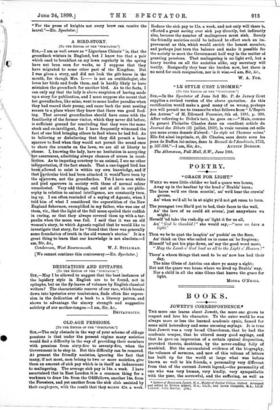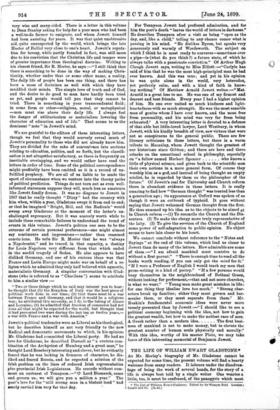BOOKS.
JOWETT'S CORRESPONDENCE.*
THE more one learns about Jowett, the more one grows to respect and love his character. To the outer world he was always more or less the learned academic cynic, famed for some mild heterodoxy and some amusing sayings. It is true that Jowett was a very broad Churchman, that he had the academic temper, that he uttered many good sayings, and that he gave an impression of a certain cynical disposition, provoked thereto, doubtless, by the never-ending folly of mankind. But the accumulated evidence of the biography, the volumes of sermons, and now of this volume of letters has built up for the world at large what was before known so well to his friends, a personality very different from that of the current Jowett legend,—the personality of one who was very human, very kindly, very sympathetic with the poor, the sorrowful, and the suffering, as well as • Letters of Benjamin Jowett, dt.A., Master of Banta College, Oxford. Arranged and edited by Evelyn Abbott, SLA., LL.D., and Lewis Campbell, M.A., LLD London : John Murray. [les.]
very wise and many-sided. There is a letter in this volume to Dean Stanley asking for help for a poor man who had been a well-to-do farmer to emigrate, and whom Jowett himself had been assisting for years. It was that quiet unobtrusive aid, quite unsuspected by the world, which brings the late Master of Balliol very close to one's heart. Jowett's reputa- tion for heresy, while partly founded in fact, was still more due to his conviction that the Christian life and temper were of greater importance than theological doctrine. Writing to his closest friend, Sir R. Morier, he says :—" I still think that there is something to be done in the way of making Chris- tianity, whether under that or some other name, a reality. The daily life of people has been one thing, and there has been a mass of doctrines as well with which they have muddled their minds. The simple love of truth and of God, and the desire to do good to man have hardly been tried as yet, and people would tell you that they cannot be tried. There is something in your transcendental fluid ;
in some form or other—religions, moral, or metaphysical —men mast rise above their daily life. I always feel
the danger of utilitarianism or materialism lowering the character of education and of life." That seems to us the dominant " note " in Jowett's mind.
We are grateful to the editors of these interesting letters, though we feel that they would scarcely reveal much of Jowett's personality to those who did not already know him. They are divided for the sake of conven;snce into sections relating to education, politics, and so forth, but the classifi- cation is not altogether satisfactory, as there is frequently an inevitable overlapping, and we would rather have read the letters in order of time. Some of the political correspondence might profitably have been omitted as it is a record of un- fulfilled prophecy. We are all of us liable to be made the sport of circumstance when we venture into the thorny paths of political prediction. Things do not turn out as even well- informed statesmen suppose they will, much less as amateurs like Jowett fondly dream. It was no disgrace to Jowett in 1867 that he really thought " Dizzy " had the country with him when, within a year, Gladstone swept it from end to end; or that he imagined "Bright, Mill, and the Radicals" would sweep away Gladstone at the moment of the latter's un- challenged supremacy. But it was scarcely worth while to include these remarkable failures to understand the trend of events in this volume. Jowett's politics one sees to be the outcome of certain personal preferences—one might almost say sentiments and impressions — rather than reasoned convictions. He tells Sir R. Morier that he was "always a Napoleonist," and he traced, in that capacity, a destiny for Louis Napoleon very different from that which ended in the sordid tragedy of Sedan. He also appears to have disliked Germany, and one of his curious ideas was that France and Latin Europe might make war on behalf of a re- ligion which he admitted they only half believed with agnostic, materialistic Germany. A singular conversation with Glad- stone (who is referred to as " Charilaus ") seems to attribute to him a similar view :-
" Two or three things which he said may interest you to hear : he thought that (1) the Kingdom of Italy was the best piece of political work done in our time; (2) that there must be a war between France and Germany, and that it would be a religious war; he attributed this necessity, as I do, to the taking of Alsace and Lorraine; (3) he admitted that freedom of commerce had not done all that might be expected for the world, but thought that it had prevented two wars during the last ten or twelve years,— a war with France and a war with America?'
Jowett's political tendencies were as Liberal as his theological, but he describes himself as not very friendly to the new Radical and democratic movements to which, in his opinion, Mr. Gladstone had committed the Liberal party. He had no love for Gladstone, he described Disraeli as "a curious com- bination of the Archpriest of Humbug and a great man," he thought Lord Rosebery interesting and clever, but he evidently feared that he was lacking in firmness of character, he dis- liked and feared Russia, and he expected a solution of the
Irish problem on the lines of reduced Irish representation plus provincial Irish Legislatures. He records without com-
ment an outburst of Tennyson :—" 0 Lord Bismarck, come and govern us ; we will give you a million a year." The poet's love for the " still strong man in a blatant land " had surely carried him very far that day. For Tennyson Jowett had profound admiration, and for him the poet's death "leaves the world of letters in darkness."
He describes Tennyson after a visit as being " open as the day, and, like a child," telling to any chance corner what is passing in his mind. "He dislikes Byron, but speaks very generously and warmly of Wordsworth. The subject on which I think he is most ready to converse—sometimes over a pipe—is (what do you think ?) a future state, of which he always talks with a passionate conviction." Of Arthur Hugh Clough Jowett says, writing to Miss Elliott :—" Carlyle has said of him that he was the most high-principled man he had ever known. And this was true; and yet in his opinion he was quite alone in the world, very heterodox, yet perfectly calm, and with a kind of faith in know- ing nothing." Of Matthew Arnold Jowett writes :—" Mat. Arnold is a great loss to me. He was one of my firmest and dearest and best friends. Every year I had a higher opinion of him. No one ever united so much kindness and light- heartedness with so much strength. He was the most sensible man of genius whom I have ever known, and the most free from personality, and his mind was very far from being exhausted." A very interesting letter is devoted to a defence of that able but little-loved lawyer, Lord Westbury, in whom Jowett, with his kindly breadth of view, saw virtues that were not so conspicuous to the general public. There are few literary criticisms in these letters, but there is a warm tribute to Macaulay, whom Jowett thought the greatest of our historians since Gibbon; and there are here and there attacks on the sensational school in philosophy, especially on " a fellow named Herbert Spencer who knows a little of physical science, and gives back to the scientific men their own notions in a more general form. Of course they worship him as a god, and instead of being thought an empty sciolist, he is regarded by them as the philosopher of the
future." Of Jowett's zeal for University and Church reform
there is abundant evidence in these letters. It is really amazing to find how " German thought" was treated less than
a generation ago ; its appearance at Oxford was spoken of as though it were an outbreak of typhoid. It goes without saying that Jowett welcomed German thought from the first. He thus summed up his idea as to the objects to be aimed at in Church reform :—(1) To reconcile the Church and the Dis- senters. (2) To make the clergy more truly representative of
the laity. (3) To give the services of the Church of England some power of self-adaptation to public opinion. No object seems to have lain closer to his heart.
We cannot conclude without reference to the " Notes and Sayings" at the end of this volume, which lead us closer to Jowett than do many of the letters. How admirable are some of them :—" I am afraid mankind must contrive to do without a first parent." " There is enough time to read all the books worth reading, if you can only get the mind for it." "If I were a Professor of English I would teach my men that prose-writing is a kind of poetry." "If a few persons would busy themselves in the neighbourhood of Bethnal Green, without looking for preferment,—that and not more churches, is what we want." " Young men make great mistakes in life; for one thing they idealise love too much?' "Strong char- acters break up families; either they must govern and har- monise them, or they must separate from them." Mr. Ruskin's fundamental economic ideas were never more tersely presented than by Jowett :—" I should like to see a political economy beginning with the idea, not how to gain the greatest wealth, but how to make the noblest race of men.
A Greek rather than a modern idea The first busi- ness of mankind is not to make money, but to elevate the greatest number of human souls physically and morally." With this idea, worthy of his master Plato, we may take leave of this interesting memorial of Benjamin Jowett.



















































 Previous page
Previous page